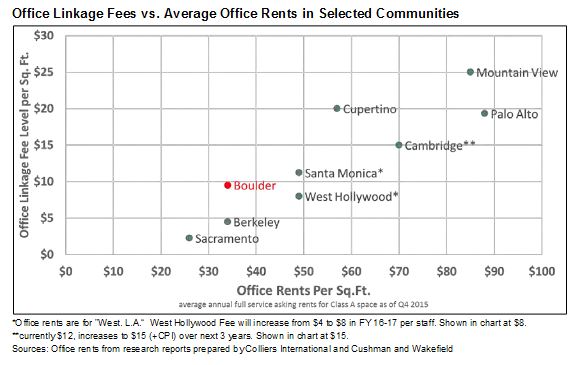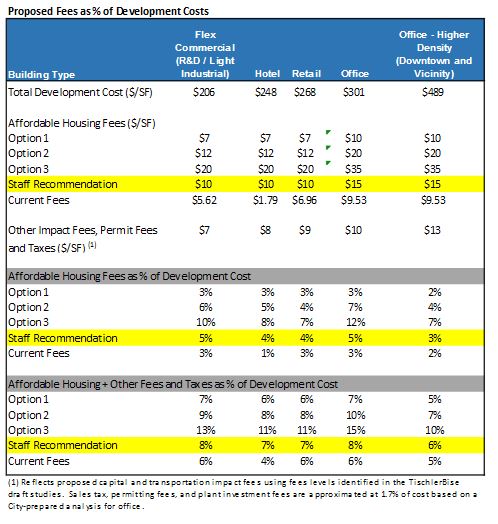Although the Boulder Valley Comprehensive Plan declares that new development should pay for its impacts on municipal facilities and services, including affordable housing, the City of Boulder currently assesses on new development only a small portion of the cost of those impacts and proposes merely a modest increase to them in the future. That was the major conclusion of a forum on development fees and excise taxes held by PLAN-Boulder County on Veterans Day, November 11, which featured presentations by Chris Meschuk, senior planner for the City of Boulder, who is in charge of its current development fee study, and Steve Pomerance, a former Boulder City Council member, who has spoken and written extensively about this subject.

Linkage fee programs in other cities, from Keyser Marsten Assoc. report in the 11/15/16 City Council packet
Meschuk defined development impact fees as a one-time charge to fund capital infrastructure investments necessitated by new development; and he explained that Boulder imposes them for police, fire, human services, the library, municipal services and parks and recreation. It also charges a “linkage fee” on commercial development to pay for a part of the additional need for affordable housing that it generates. As well, the city levies development excise taxes to pay for park land and transportation facilities.
The city last adjusted development fees and excise taxes in 2009. The current project to update the fees and taxes, Meschuck stated, began in January, 2015. Two consulting firms have been engaged. The Council has reviewed the project and provided direction about it on seven occasions. Six meetings of the citizens “technical working group” have been held.
Meschuck said the city plans to add a transportation impact fee on new development to pay for street improvements, while revenues from the transportation development excise tax will fund bus, bicycle, and pedestrian facilities. He also said that the staff has proposed—and the Council seems to have accepted—the moderate increases to the non-residential and residential development impact fees and excise taxes that the consultants recommended. For a typical three-unit townhouse, he said the charges would rise from $5.79/sq. ft. to $6.84/ sq. ft., while for a typical office building with a small retail space they would go from $3.48/sq. ft. to $4.45/sq. ft.
For the affordable housing “linkage fee,” Meschuck said the Council has indicated it was not interested in adopting anything close to the maximum legally supportable fee. The current fee is $9.53/sq. ft. for an office building, which subsidizes about 18 affordable housing units a year. The consulting firm that the city hired, Keyser Marston Associates, found that, if the full need for affordable housing which development generated was paid for, the following types of commercial uses would have to be charged the following amounts (to the nearest dollar):
Office $130/sq. ft.
Retail $159/sq. ft.
Light industrial $96/sq. ft.
Hospital $130/sq. ft.
Lodging $60/sq. ft.
Warehouse $55/sq.ft.
Institutional $45/sq. ft.
Assisted living $128/sq. ft.
However, with the Council’s approval, the consultants reduced those sums by 55% as a “commuter adjustment.” The reasoning was that only 45% of the people who work in Boulder now live in Boulder, and the city has not planned for more than that percentage to live within its borders in the future. With this adjustment, the maximum legally supportable fees fell to the following levels:
Office $58.40/sq. ft.
Retail $71.50/sq. ft.
Light industrial $ 43.40/sq. ft
Hospital $ 58.40/sq. ft.
Lodging $27.20/sq. ft.
Warehouse $24.70/sq. ft.
Institutional $20.40/sq. ft.
Assisted living $57.50/sq. ft.
Nevertheless, the Council indicated that, despite this reduction, it wanted much lower “linkage fees.” It asked the staff to consider “market and economic factors” and study rates of $10, $20, and $35/sq. ft. for office space—with commensurate adjustments for the other types of commercial uses. The staff determined that “comparable cities” have “linkage fees” that total up to 5% of development costs. As a result, Meschuck said that the staff has recommended the following linkage fees:
Office $15/sq. ft
Retail, hotel, flexible commercial $10/sq. ft.
Warehouse $4/sq. ft.
At those levels, Boulder’s linkage fees would be about 5% of development costs, and the total of “linkage fees,” and development impact fees and excise taxes would be 6-8% of development costs.

Staff chart showing three linkage fee options and the staff’s recommendation, from 11/15/16 CC packet
Pomerance asserted that the methodology used to determine the transportation development excise tax was fundamentally flawed, because neither the city nor the consultants have established a plan to maintain current levels of transportation service. Without a plan, transportation costs are indeterminable. He said that the closest the city has come to setting such a plan occurred in the city’s 2014 TMP Vision Plan. That document found that during the next 20 years $459 million more than currently anticipated revenues would be needed to keep traffic moving at levels similar to the present time. The $459 million “shortfall” was not considered when the proposed increases in the transportation development impact fee and excise tax were determined, Pomerance noted.
He also criticized the impact fee study for failing to require that new development pay back the public for the land that the city has bought in past years for parks and recreation and other purposes. He pointed that out new development is required to pay back in full the past investments that the city has made in its water, wastewater and flood control infrastructure. Why should the same principle not apply to city investments in land for its other facilities, he asked.
Pomerance reminded the audience that if new development does not pay for the full cost of its impacts on municipal facilities and services, the general public will have to pay for them either in the form of new taxes or degraded services.
He also declared that new development could easily afford much higher development fees. He calculated, for instance, that the developer’s profit from the Pearl West Building at the old Daily Camera site at 11th and Pearl Streets will range from $250-500/ sq. ft. at the current levels of development fees and excise taxes and housing “linkage fees” (and not much less at the proposed levels).
After the presentations, many audience members at the forum expressed dismay at the apparent disinterest of the City Council in compelling growth to pay its own way. City Council member Sam Weaver, who attended as part of the audience, commented “At the end of the day this is a political decision…Developers have a lot of power in town.” Weaver said that he and Council member Lisa Morzel planned to argue for a much higher range of fees than the staff had proposed, but he doubted that they would prevail.
(Indeed, at its November 15 meeting, Council followed the recommendation of the Boulder Chamber of Commerce and Boulder Housing Partners a/k/a The Boulder Housing Authority and approved an affordable housing “linkage fee” of $12/sq. ft. for office space and commensurately lower rates for other commercial uses. This is $3/ sq. ft. lower than even the city staff recommended.)


